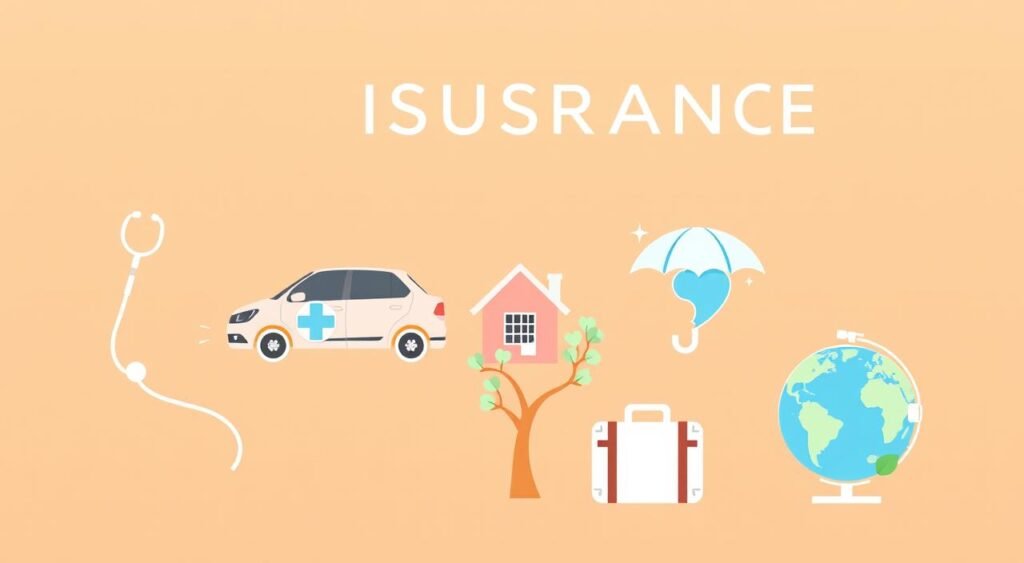Sophia, a young professional, was always careful with her money. But a friend’s sudden medical issue changed her view on insurance. Seeing her friend’s financial stress made Sophia think about her own insurance needs.
She decided to act to protect her financial future. Invest in Insurance can seem hard, but it’s key to keeping your finances safe. The best time to get insurance depends on your age, life stage, and money situation.
In this article, we’ll look at what to consider when deciding on insurance. This will help you make choices that secure your financial future and give you peace of mind.

Insurance is important at any stage of life. Whether you’re starting your career or nearing retirement, knowing about insurance can help. It prepares you for life’s surprises and keeps your finances safe.
Table of Contents
Understanding the Importance of Insurance Coverage
Getting the right insurance is key to a secure financial future. It protects your health and assets. Different insurance types act as a safety net against life’s surprises.
Types of Insurance Protection Available
The world of insurance coverage options is wide. Policies like life, health, homeowner’s, and renter’s insurance offer great protection. They help individuals and families stay safe.
Benefits of Early Insurance Investment
Starting early with insurance brings big early Invest in Insurance. You get lower premiums and a solid coverage base. This leads to more financial security and peace of mind through life’s ups and downs.
Risk Management Through Insurance
Insurance is a strong risk mitigation tool. It protects you from financial hits from unexpected events. Whether it’s medical emergencies or natural disasters, the right insurance keeps you stable.
“Insurance is not just a safety net, it’s a strategic investment in your future.” – Jennifer Walters, financial advisor
Knowing about insurance types, coverage options, early investment benefits, and risk mitigation helps you make smart choices. This way, you can create a tailored insurance plan that fits your needs.

Life Milestones That Signal When to Invest in Insurance
Understanding insurance can seem hard, but knowing when to get it is easier. Life events like starting a family or changing careers are key moments. They tell you when it’s time to get the right insurance for your life.
Starting a family is a big deal. It means you need life insurance to protect your loved ones’ future. You also need health insurance for pregnancy and childbirth costs.
Buying a home is another big event. Homeowner’s insurance helps protect your biggest asset from damage or theft. You might also want personal liability insurance to keep your wealth safe.
Career changes are important too. A new job might mean you need to change your health insurance. Retirement could mean you need long-term care insurance for future health costs.
By paying attention to these life events, you can manage your risks better. Getting the right insurance at the right time gives you peace of mind. It helps you face life’s challenges with confidence.
| Life Event | Insurance Trigger | Key Considerations |
|---|---|---|
| Starting a Family | Life Insurance, Health Insurance | Ensure financial security for your loved ones, cover medical expenses related to pregnancy and childcare |
| Purchasing a Home | Homeowner’s Insurance, Personal Liability Insurance | Protect your most valuable asset, safeguard your wealth from potential liabilities |
| Career Changes | Health Insurance, Long-Term Care Insurance | Adjust coverage to match new job requirements, prepare for healthcare needs in retirement |
By understanding life events and insurance triggers, you can plan better for your family and career. This ensures your insurance keeps up with your changing life.

Financial Readiness: Key Indicators for Insurance Investment
Invest in Insurance is a big financial step. It’s important to check if you’re ready for this. Look at your finances, plan your budget, and save for emergencies. This will help you decide if it’s the right time to get insurance.
Assessment of Current Financial Status
First, check your current financial situation. Look at your income, debts, and other financial duties. Knowing your finances helps you see if you can afford insurance without hurting your money.
Budgeting for Insurance Premiums
After checking your finances, make a budget for insurance. Insurance affordability is key. You want to make sure insurance doesn’t break the bank. Set aside money for insurance to keep you and your family safe without financial stress.
Emergency Fund Considerations
Having an emergency savings fund is also important. It’s for unexpected costs like medical bills or losing your job. A good emergency fund helps you handle insurance costs without risking your savings.
| Financial Indicator | Ideal Scenario | Cautionary Scenario |
|---|---|---|
| Income | Stable and sufficient to cover insurance premiums | Irregular or insufficient to comfortably accommodate insurance costs |
| Debt Levels | Low or manageable debt-to-income ratio | High debt-to-income ratio, limiting financial flexibility |
| Emergency Fund | Adequate savings to cover 3-6 months of living expenses | Insufficient emergency savings, leaving financial gaps |
By looking at these financial signs, you can figure out if it’s time for insurance. Remember, being financially ready is an ongoing task. You need to keep checking and adjusting as your life changes.
Common Mistakes to Avoid When Purchasing Insurance
Insurance can be tricky to understand, and mistakes can leave you at risk. We’ll look at common errors to avoid. This way, you can get the right protection without wasting money.
One big mistake is under-insuring. People don’t always know their true risks. This can cause big financial problems if something unexpected happens. On the other hand, over-insuring can also be a problem. It means spending too much money on insurance that you don’t really need.
Another mistake is not fully understanding your policy. Missing important details can lead to surprises when you need to make a claim. It’s important to read your policy carefully and ask questions to make sure you know what you’re covered for.
Not updating your insurance when your life changes is another mistake. Things like getting a new job or having a family can change your insurance needs. It’s important to check your insurance regularly and update it as needed.
To avoid these common insurance pitfalls, follow these tips:
- Know your risks and make sure you have enough coverage
- Read and understand your policy, including what’s not covered
- Check your insurance regularly and update it as your life changes
- Work with a trusted insurance expert to help you make the right choices
By being proactive and avoiding these mistakes, you can make sure your insurance works for you. This way, you get the protection you need without wasting money or having gaps in coverage.
How to Strategically Invest in Insurance
Understanding insurance can seem tough, but with the right strategy, you can get the best coverage. This part talks about how to pick the right insurance, compare providers, and adjust your policies as needed.
Choosing the Right Coverage Levels
Finding the right amount of coverage is key. First, think about your risks now and in the future. Consider your assets, debts, and lifestyle. This helps you know where you need the most protection.
Comparing Insurance Providers
Not all insurance companies are the same. Spend time looking at different companies. Check their financial health, how happy their customers are, and what they offer. This helps you find the best fit for you.
Policy Review and Adjustment Strategies
Your insurance needs can change. It’s important to check your policies often and make changes as needed. This might mean adding or removing coverage, updating who gets your benefits, or looking for new policies. Being proactive helps keep your insurance working for you.
| Strategies for Strategic Invest in Insurance | Key Considerations |
|---|---|
| Choosing the Right Coverage Levels | – Assess current and future risks – Tailor coverage to your specific needs – Avoid over-insuring or under-insuring |
| Comparing Insurance Providers | – Research financial stability of insurers – Evaluate customer satisfaction and ratings – Consider the breadth of coverage options |
| Policy Review and Adjustment Strategies | – Conduct periodic policy reviews – Adjust coverage levels as needed – Update beneficiaries and other details |
By using these strategies, you can improve your coverage optimization. You’ll make better insurance comparison choices and make smart policy adjustments. This ensures your strategic planning for insurance investment will benefit you in the long run.
Long-term Benefits of Early Insurance Investment
Invest in Insurance early brings a lifetime of financial security and peace of mind. By getting coverage young, you pay less in premiums. Your policy’s cash value grows over time, helping protect against life’s surprises.
This approach also aids in managing wealth and planning for the future. It’s a smart way to ensure your family’s financial safety.
Life insurance, for example, guarantees your loved ones are taken care of. Disability insurance keeps your income steady, letting you pursue your dreams without financial stress.
Also, the cash value in insurance grows early, becoming a valuable asset. It can fund your child’s education or boost your retirement savings. This flexibility lets you plan wisely for your future and create a lasting legacy.
FAQ
When is the right time to invest in insurance?
The best time to invest in insurance varies based on life stages and financial stability. Starting a family, buying a home, or changing careers often means you need more insurance. It’s about being ready for life’s big changes.
What are the different types of insurance protection available?
There are several types of insurance, like life, health, property, and disability. Each type helps manage risks and protect against financial loss. They offer unique benefits for individuals and families.
What are the benefits of Invest in Insurance early?
Invest in Insurance early has many advantages. You get lower premiums and better coverage options. It also boosts your financial security. Early investment prepares you for unexpected events and secures your financial future.
How does insurance help in risk management?
Insurance is key for managing risks. It helps handle unexpected events like accidents or illnesses. It acts as a safety net, protecting you from financial disaster.
What life milestones indicate the need for insurance investment?
Certain life events signal the need for insurance. These include starting a family, buying a home, career changes, and retirement. These moments are great times to review and invest in the right coverage.
How can I assess my financial readiness for insurance investment?
To check if you’re ready for insurance, look at your finances. Make a budget that includes insurance costs. Also, have an emergency fund. This ensures you can afford insurance without straining your finances.
What common mistakes should I avoid when purchasing insurance?
Avoid common mistakes like underinsuring and not reading policy details. Also, don’t choose the wrong coverage or forget to update your policies. Being informed and regularly reviewing your insurance can help you avoid these errors.
How can I strategically invest in insurance?
To wisely Invest in Insurance, choose the right coverage levels. Compare different policies and providers. Regularly review and adjust your insurance to match your changing needs and finances.
What are the long-term benefits of early insurance investment?
Early insurance investment brings long-term benefits. It enhances financial security and peace of mind. It also helps protect your wealth and leave a legacy for your loved ones.
